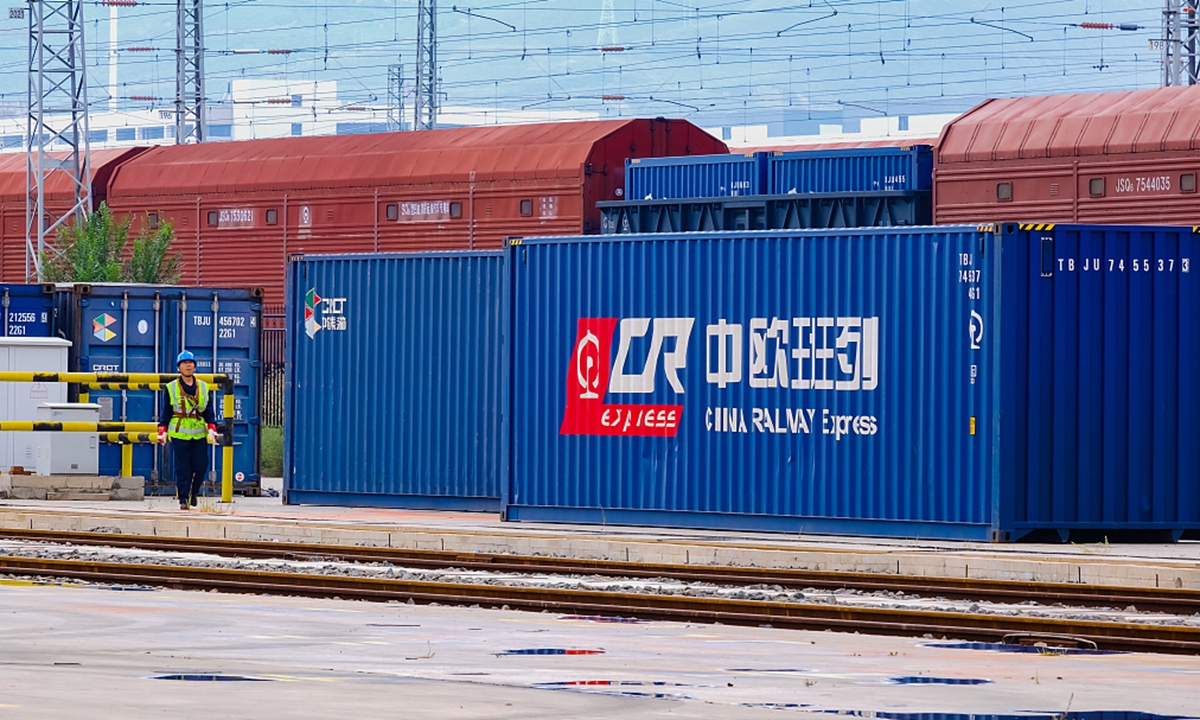
China-Europe freight train Photo:VCG
As Poland considers cutting off its rail link to Belarus due to their heightened diplomatic tensions, many Chinese companies are concerned its knock-on effects because border crossings are a vital channel for China-Europe freight trains.
Following Poland's closure of the Kuznica border crossing and Belarus' threat to cut gas transit to the EU, Poland is reportedly to block railway traffic with Belarus, said the Minister of Internal Affairs and Administration of Poland Mariusz Kamiński on the air of the radio station RMF FM.
According to RailFreight.com, more than half of the cargo volume carried by Belarussian Railway was in transit between Europe and China last year.
The losses arising from closing Belarus' rail link on the Polish border would be massive for China-Europe freight trains, and alternative routes would be time-consuming, companies warn.
"Over 300 China-Europe freight trains are currently en route to Brest, and more than 50 trains are waiting to cross the port," Tommy Tan, president of Shanghai EPU Supply Chain Management Co, a veteran agent of China-EU railway freight trains, told the Global Times on Tuesday.
A prolonged cargo backlog would result at the border port if the railway traffic is cut, Tan said.
"What I am also worried about is the lower number of workers at border checkpoints, leaving cargo unloaded at the ports," he added.
Xu Yuanyuan, manager of Shaanxi Further Strategy Supply Chain Management Co, told the Global Times on Tuesday that some of his shipments had been halted in Kazakhstan for about 10 days for unknown reasons.
"Most of the China-Europe rail cargo goes through Minsk. If we cannot get through via this route, other options including transiting via Lithuania and Ukraine would mean going the long way round, and they are not good choices," Xu said, adding the Sławków rail terminal in southern Poland is the popular choice.
From January to October, 12,605 China-Europe freight trains carried around 1.22 million standard containers of cargo, surpassing 2020's total annual volume, official data showed.
A person who has knowledge about China-Europe freight train operations, based in the world's largest small commodity market Yiwu, Zhejiang Province, said 24 percent of the cargo shipped from Yiwu to Europe goes through Belarus and Poland.
"So far, there is no big impact," the person said on condition of anonymity.
"Right now, both Poland and Belarus are looking for bargaining chips and hopefully they will resolve the disputes through negotiations," Cui Hongjian, director of the Department of European Studies at the China Institute of International Studies, told the Global Times on Tuesday.
"There is little that we can do, but Chinese companies can make pre-arrangements and dispatch the trains in advance before cargo shipments," Cui suggested.
Tan noted that closing all rail links is unlikely, either from a political or economic perspective, and all the Belt and Road Initiative partner economies should have had contingency plans for cross-border cargo trains, should there be any disruptions.
"If the ports are suspended, there are other alternatives for the trains, such as through direct shipment from Kaliningrad in Russia to West European countries, but the transportation capacity is limited," Tan said.




